
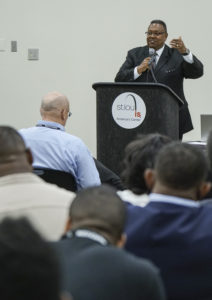
Ken Weathersby has held many different titles; however, he has always had the same role.
“The role is servant,” said Weathersby, former vice president for Convention advancement for the SBC Executive Committee.
From his work with the Tennessee Baptist Convention, the North American Mission Board, the SBC Executive Committee, and others, Weathersby remained emphatic that the point of his work and therefore his service was to spread the Gospel of Christ, not for the benefit of his own personal gain.
”It’s all about the Kingdom of God,” Weathersby said. “My focus has never been about me. My focus has always been about serving churches.”
Weathersby broke new ground in nearly every position he held.
He was the first African American pastor to hold a full-time associate professorship at New Orleans Baptist Theological Seminary, where he was director of the Cecil B. Day Center for Church Planting and director of the Nehemiah Project.
Marshal Ausberry, first vice president for the SBC, noted that Weathersby built many bridges for the Convention.
“We can truly call Ken a trailblazer,” Ausberry said. “We celebrate Ken and the accomplishments God has allowed him to achieve within the SBC.”
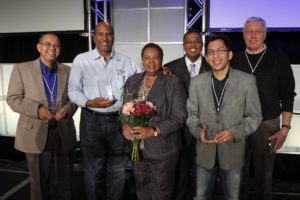
Some of his other roles include manager of African American church planting at NAMB as well as senior strategist for evangelism and vice president for church planting. He also served as the associate vice president for multi-ethnic mobilization.
“Ken has helped bring people of various ethnicities together and he has worked tirelessly to make positive inroads for all people groups within the SBC,” Ausberry said.
Weathersby said that he desired to go wherever God called him in order to have a long-lasting Kingdom impact.
“God called me to Himself, and so whatever He wants to do I would do,” Weathersby said. “I love the opportunity to see people come to know Christ, so my heart and my passion is to assist the local church in making disciples among all the nations, encouraging them to be involved in missionary activities, training indigent leaders, and networking for evangelism that results in church revitalization.”
Weathersby noted that during his time at the SBC, great strides were made in creating an inclusive culture—breaking barriers of culture, race, and generations for the cause of the Gospel.
“Oftentimes we highlight the challenges of the past and we do not recognize the impact the Convention has made in race relations,” Weathersby said. “The SBC is now the most ethnically diverse denomination of congregations in the United States, and many people do not realize that.”
Weathersby said that when he first joined the SBC there were around five hundred predominantly African American churches. Now, there are around four thousand.
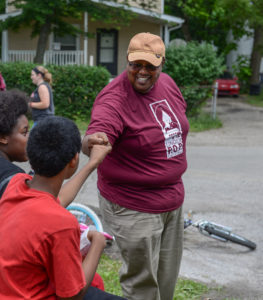
Weathersby credits this substantial growth to SBC’s emphasis on church planting.
”We have intentionally worked to mobilize churches to reach the nations,” Weathersby said. “Many people do not realize that the majority of our ethnic congregations across the SBC were planted by our predominantly Anglo congregations. Our Anglo churches have been the Send Churches needed to plant those churches.”
This missional mindset has resulted in crossing cultural lines in order for new churches to be planted, creating the diversity within the SBC church community.
Explaining his motivation ministry, Weathersby said that his ultimate desire is to give everyone an opportunity to hear the Gospel.
“I want to make sure Christ’s name is known,” Weathersby said. “I believe every believer ought to be sharing the good news of Christ.”
Moving forward, Weathersby said he is confident the SBC will continue down the path of inclusive church planting that cultivates even greater diversity.
“We have leaders across all ethnic lines who are prepared, who are ready, who are taking the baton and will take on the mission of making Christ known in North American and across the world,” Weathersby said.
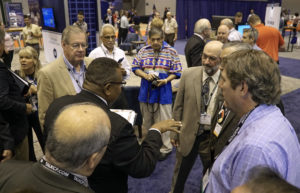
To continue to have a global impact, however, Weathersby offered three challenges.
“Everyone needs to seek to understand in order for them to be understood,” Weathersby said.
Creating a more inclusive culture will come when groups are willing to talk to each other, rather than about each other, according to Weathersby.
“Value differences, whether they be ethnically, culturally, or generationally.”
Weathersby said differences on all levels must not only be recognized, but prioritized and celebrated.
“We need to put our hands to the Gospel plow together in order for us to develop a new culture,” Weathersby said. “We need to focus on the mission, the task, and not upon our culture, but on sharing the name of Christ so that He would create His culture.”
Weathersby said that personally, he has always felt a unique call to give a voice to the voiceless.
“I have always tried to give value to, highlight, and appreciate those who sometimes believe they did not have a voice,” Weathersby said. “I felt like my role was to be their champion. I wanted to champion and thank them for their contribution to the Kingdom, that we are all working together and together everybody accomplishes more.”
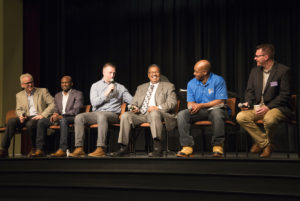
Inclusivity requires effort from everyone, Weathersby said.
“There’s a lot of room to work together to send missionaries,” Weathersby said.
Regardless of differences, everyone needs to hear the name of Jesus.
Ausberry also noted that Ken never gave up on his call or mission, because he was confident in the great God he served.
“One of the lasting impressions I have of Ken is his positive outlook and his attitude to never give up no matter what life brings along the way,” Ausberry said. “Though Ken is retiring from day to day with the Executive Committee, he is not retiring from serving God. Moving forward, I hope Ken will be utilized as a resource for our seminaries, NAMB, and IMB with his background and experience in church planting, evangelism, and recruitment."
As he retires and moves to a new stage of ministry, Weathersby said he hopes to leave behind a legacy that encourages others to succeed.
“I have always been a leader that valued others hopefully more than I have valued myself,” Weathersby said. “If I can help other leaders succeed and the Kingdom of God is impacted, then I have achieved my purpose.”
















